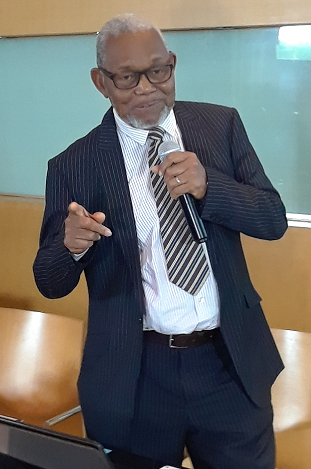Stakeholders at every level of intervention have been advised to collaborate and review administrative processes and the approach leading to the identification of plants, scientific research, development and approval of remedies and drug production from Nigerian herbs and plants.
This call was made by Emeritus Prof. Joseph Okogun, of the Department of Chemistry, University of Ibadan, at a public lecture, which was part of activities organised to mark his 80th birthday by Bevekt Gedu Chemical Company.

The lecture titled: “Active, Bitter and Sweet – A Lifetime of Research on Plants, Anti-Cancer Remedies and Drug Discovery”. Okogun described plants as unrivaled organic chemical factories, producing useful chemicals that man exploits for various purposes, and the reasons why the natural chemistry of plants is important to healthy living.
He also spoke on a variety of active ingredients that have been discovered from everyday leaves and fruits found in Nigeria and West Africa that can either treat or manage a lot of common ailments in Nigeria and elsewhere at affordable cost.
“There are organic and natural remedies for the management of various diseases including cancer and HIV/AIDS using several decades of data from scientific research on plants by Bevekt Gedu. Out of Bevekt Gedu’s work, a pure compound initially obtained from a Nigerian plant which has been adopted and about to be finalized for drug development as a blockbuster drug by IMI of USA. This is an indication that opportunities for long lasting and sustainable investments are abundant locally”, he asserted.
The public lecture was chaired by Engr. Adama Okoene, former managing director, Midwestern Oil. It was attended by healthcare professionals, academicians and other professionals from public and private sectors.
Prof. Okogun further explained the extraction, isolation, analysis and modification of active natural products for potential drug leads or drugs and molecular probes; and the role of different professionals in the process of drug discovery.
Plant materials are usually processed and powdered for extraction with solvents of various polarities so that different types of compounds are extracted by the different solvents. The solvents range from gases (carbon dioxide and hydrocarbon) in supercritical fluid states, petroleum either through ethanol to water. For instance, the removal of solvent, the usually dark brown gum is separated into the component compounds in the mixture using various chromatographic methods with or without bioactivity screening depending on the nature of the targeted compounds.
He explained that biological activity screening is done by pharmacognosists, pharmaceutical chemists, pharmacologists, biochemists and microbiologists to identify potential drugs and other biologically active compounds including pesticides. Toxicologists determine the toxicity including teratogenicity of identified potential drugs.
When biologically active compounds are identified, there may be need to improve on the activity and or toxicity by modifying the structures using chemistry linked with biology. Identified potential drugs with known mechanism of actions are used as molecular probes in diagnosis and disease research.
Generally, drug discovery and production are results of a multi-disciplinary enterprise and require input from most human disciplines of study which Prof. Okogun gave as follows; botanists as taxonomists, chemists for isolation and chemistry/identification of active principles, zoologists and animal breeders produce animals needed in invitro and invivo studies; while biochemists, pharmacognosists, pharmacologists and microbiologists conduct biological activity studies.
In addition, toxicologists do toxicity studies, clinician (human and veterinary) and pharmacist will do clinical studies and use-as medicines, while lawyers and entrepreneurs for patenting and marketing respectively. All of these activities by different stakeholders will create a local value chain and lead to the multiplier effect of saving foreign exchange and thousands of jobs in the rural and urban areas.











liquid tadalafil – tadalafil professional tadalafil canadian pharmacy